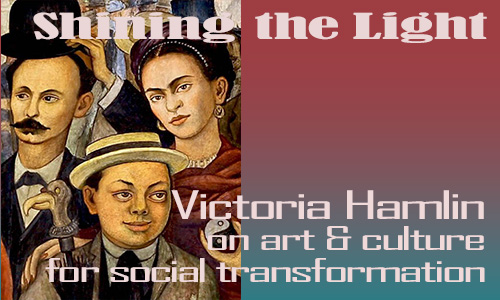|
|
|
|
The weekly newsletter of the Mexico Solidarity Project |
|
Every issue archived online at mexicosolidarityproject.org |
|
|
|
February 07, 2024/ This week’s issue/ Meizhu Lui, for the editorial team |
|
|
|
Tweet tweet! Zoom zoom! Hug hug! |
|
|
Tweet tweet! Zoom zoom! That’s the soundtrack of our lives these days. But there’s no replacement for meeting face to face, for sharing a hug. Some day we may evolve — or is it devolve? — into AI bots. But for now, we crave human contact, where we can use our more than five senses to size up the person we are communicating with.
With the advent of all this technology, it’s hard to separate truth from fiction. We see videos of multi-billionaire Elon Musk selling $5.00 mosquito catchers. New Hampshire residents get a call with President Biden’s voice telling them to skip voting. Mainstream news sources say that AMLO was in cahoots with drug cartel figures in his 2006 campaign.
The best antidote? Cara a cara. The Mexico Solidarity Project’s José Luis Granados Ceja spoke at ten different events on the East coast in October — to students, Latinx organizations, leftists, union activists, community groups. The many who attended got the real scoop on what’s going on in Mexico from someone who lives there, who has experienced firsthand the changes since AMLO’s election, and who reports the facts honestly. If his audience was tempted to think they were getting the truth from the mainstream media, they found out who not to trust and why, and where to get good information. (At https://mexicosolidarity.com/ and from this Bulletin.)
Long time Mexico solidarity activist Juliana Barnet helped organize the DC events. Today, we share her conversation with Diana after José spoke with students in the organization she co-chairs at the University of Maryland.
The West Coast tour is going on now. If you’re in one of the cities he’ll visit, don’t miss the chance to ask all your questions about Mexico — and maybe get a hug! |
|
|
|
Announcing the New Mexico Solidarity Media! |
|
|
Watch brief testimonials from international supporters of the latest Mexico Solidarity Project effort! |
|
|
|
We’re excited to announce MSP member José Luis Granados Ceja’s in-person US speaking tour! |
|
The Mexico Solidarity Project, Liberation Road/Camino para la Libertad, and Democratic Socialists of America are proud to host this accomplished investigative journalist from Mexico City. He will speak, among other things, on issues of immigration and the border, national sovereignty, and labor, and what this means for Mexico and US progressives. Here are the West Coast cities José Luis will visit and the dates:
Jan 31 - Feb. 2: Portland, OR Feb. 3: Salem, OR Feb. 4 - 6: Oakland and San Francisco, CA Feb. 6 - 7: San Diego, CA Feb. 8 - 10: Los Angeles CA
Bring friends and feel free to share this notice. Donations gratefully accepted. Any questions? Contact Betty Forrester or Jeff Elkner |
|
Real Information about Latin American Politics |
|
|
Mexican born Diana Carrillo came to the US when she was eight. A University of Maryland Master of Public Policy candidate, she co-founded UMD’s College Park student organization, La Gente in Public Policy. La Gente aims to build community, create connections, and empower undergrad, grad students, and alumni who identify as Latinx with “an international lens in recognition of the diversity within our community.”
Solidarity activist Juliana Barnet spoke with Diana after José's event at La Gente. |
|
How do your friends and family in Mexico see the country’s changes since the president Lopez Obrador (AMLO) came into office?
I’m close to my extended family, and we visit Mexico often. Most people are talking about the new social programs, particularly the cash transfers for the elderly. My older aunts and uncles can buy food and other things for the week now. They’re more independent and don’t have to rely on their children for money.
I think many young people hope the improvements will continue. Personally, I don’t expect big changes in just six years. But I’m going to follow the presidential campaign more closely, especially after José Luis’s presentation. He also made me think my courses should cover Mexican internal politics better than they do!
Where do you get information, here in the US, about what’s going on in Mexico? |
|
Oh, mostly on social media like TikTok, Facebook, and so on.
My dad’s very informed and he forwards me things on Mexico sometimes. I don’t look too much at Univision or Telemundo because they have their own agendas. Recently, Univision had a friendly interview with Trump that gave him a platform there! But that’s what our community watches. We need other ways to get information. |
|
|
Technoguia/Univision |
|
Are you — and others you know in the Mexican community — concerned about how Mexicans are portrayed in the US news?
Unfortunately, I’ve heard the negative rhetoric about Mexico and Mexicans as long as I can remember, sometimes from our own people. Immigrants with “document privilege” don’t always have a good image of immigrants without documents. In that way, our community is divided.
We have this narrative of pulling ourselves up by our bootstraps. I’ve had “document privilege” since my father is a citizen, so I never had the worry and fear that my family needed to hide in the shadows. But not everyone understands their privilege. It’s always, “Why don’t ‘they’ do things the proper way?”
We’re fighting for the crumbs at the bottom and having the advantages of documents or citizenship makes you feel you’re closer to the top. When politicians reference the “bad hombres,” that’s not you, you aren’t one of those unwanted social and political “deviants.”Sowing divisiveness is a political strategy of a lot of candidates and officials.
Changing this starts with challenging each other individually. For instance, I speak up when my mom is watching something negative or says something divisive about those in a different position within our community.
José did a presentation with La Gente. What are some points and reactions that you remember?
One day my supervisor said that we need to hear different perspectives in Latin American journalism. Coincidentally, the next day an advisor, Sam Pizzigatti, suggested José Luis’s presentation to me and La Gente. It was a great idea and the School of Public Policy supported us in hosting the event.
I remember a student saying, maybe the general public buys into the negative narrative about Mexico, but young Mexicans — and especially young families — are moving back to Mexico to take advantage of some of the wonderful things not appreciated about Mexico by the public. |
|
José talked about US imperialism affecting all of Latin America. Here at UMD, we understand solidarity across the countries we are from. |
|
Some students are born here, some elsewhere, but when asked they still say, “I’m Peruvian, or Guatemalan, or Mexican.” But there’s never been any division or tension within the Hispanic students at UMD — we know there are not many of us, and we need to stick together. Being a minority on a campus is never easy. A lot of us are first generation students; we understand each other’s challenges. |
|
|
Metro Latino USA/diversity in the Latin American community |
|
It was reassuring to hear in José’s pesentation that a lot of Mexicans support the candidate of Morena for the next president, Claudia Sheinbaum, and about why she’s their candidate. Her identity is so different from AMLO’s; I was relieved that people have faith that she’ll continue to uphold his achievements. José Luis also explained how the PAN/PRI candidate gets portrayed in the media, especially in the US, as positive!
What do you think is the importance of events like the one we had with José Luis, for people in the US studying public policy and/or journalism?
Not everyone is tuned in to Latin America. If his presentation had coincided with a news event about Mexico that was getting a lot of public attention, more people might have come. But I’m thankful for the turnout we had. José Luis was a great presenter and gave an expert summary of what’s going on. |
|
|
Sam Pizzigati, Diana Carillo, co-chair, José Luis Granados, and some members of La Gente in Public Policy, UMD |
|
Public policy students need a more diverse perspective on international politics, specifically on Latin America. We can’t be going out into the world as policy people equipped only with a narrow view that’s based on information from the US media and US experts.
I hope we’ll have more of these dialogues, so that we hear, for instance, about what’s going in Ecuador and Guatemala. We don’t hear enough about events in our countries from the US media in general, let alone on a college campus.
We do hear about our countries from our families, but then, “Oh, we gotta go to school, we can’t bring that situation here because it’s not part of the curriculum!” [Laughs] It was a relief to have this presentation, because if more public policy students had access to this broader perspective, perhaps public policy would change for the better. |
|
|
|
|
More than a Wall/Más que un muro by David Bacon |
|
|
Activist Vicky Hamlin, a retired tradeswoman, shop steward, and painter, shines the light — in her art and in this column — on the lives of working people and the world they live in. |
|
|
Not just a wall. Not just a line. The border between Mexico and the United States makes for its own unique region with a history, peoples, and a culture built on love, survival, and shared stories. Photojournalist David Bacon brings the dimly lit realities of this region into sharp focus in his book, More Than a Wall/Más que un muro. Bacon offers here more on his life’s work and how he hopes his fascinating new book will contribute to it. |
|
|
|
I’m what you would call a social movement/participant photographer/journalist, meaning that the work that I do is as a participant in the social movements that are being documented. |
|
For example, Maclovio Rojas was one of the communities of resistance set up by people who live on the border. Many worked in the Han Yung maquiladora, so what began as community organizing flowed into worker organizing. I knew some of those involved and began documenting the strike. Since I had been a union organizer for a long time, the whole question of a strike was something I was very familiar with already. So my purpose was not just to show the reality of what was happening. Part of it was very concrete - to get support for the union. |
|
|
Santiago Juxtlahuaca, Oaxaca, 2008. Zacarias Salazar with a wooden plow. |
|
It’s interesting the way the political histories of the two countries track each other. The Macarthyite purge of alleged Communists in the US and the repression of the left in Mexico during the same period is very similar. Each country has its own dynamic but we have a lot of points where we touch each other. There’s a lot that people in the US can learn from Mexican artists and photographers. |
|
|
Calexico, California, 2010. Workers bundle up against the cold. |
|
From the beginning of the 90s I could see that the border was something that needed explanation, it needed articles, it needed photographs for us to understand what was going on. Anyway, the book gets produced because I keep going back and going back and going back. |
|
|
Tijuana, Baja California, 2000. A Family supporting the campaign of Cuautémoc Cardenas. |
|
|
|
|
Recent news reports and commentaries, from progressive and mainstream media, |
|
Mexican president criticizes U.S. threats to close border as "demagogic" Xinhua. "With a modicum of intelligence, you couldn't think that this is a solution," Lopez Obrador told reporters at the National Palace in Mexico City.
Xóchitl Galvez: Se pagan millones a los portales para agredirme, atacarme y ridiculizarme Sin Embargo. La candidata presidencial del Partido Acción Nacional (PAN), del Partido Revolucionario Institucional (PRI) y del Partido de la Revolución Democrática (PRD) explicó que sus conferencias se realizarán tres veces a la semana a las 10:00 horas, pero únicamente durante el periodo de la intercampaña.
John Cassidy, Can the Government of Mexico Bring the U.S. Gun Industry to Book? The New Yorker. A federal appeals court has ruled that a lawsuit from the Mexican government against American firearms manufacturers can move forward. Now the gunmakers are preparing an appeal to the Supreme Court. Karen Osorio, Xóchitl Gálvez 'escapa' con el rostro cubierto ante manifestantes en Nueva York debate. La candidata presidencial mexicana de derecha en una gira para presentar su candidatura a intereses corporativos y políticos estadounidenses se ha topado con protestas de inmigrantes mexicanos.
David Bacon & Humberto Montes de Oca, A New Life for Mexico’s Oldest Union NACLA. “Our vision is defending the interests of workers and a democratic union life.” In conversation with a longtime labor journalist, a Mexican union leader puts current worker struggles in context.
Álvaro Delgado Gómez, EU recibe a Gálvez sin embargo. Xóchitl visita al Departamento de Estado y a la OEA en medio de embestida a AMLO. Anatomy of a Hit, US Press Smears Mexico’s AMLO Soberanía. A clumsy, rehashed hit and a clear attempt to interfere in the 2024 Mexican election...all brought to you by the DEA.
Rubi Martinez, “¿Hay pruebas sí o no?”: ‘Astillero’ enfrenta a Anabel Hernández por señalar vínculos entre AMLO y cártel infobae. Julio Hernández cuestionó a la periodista mexicana y aseguró que su trabajo es literario, no periodístico, pues no presentó ninguna prueba
Kurt Hackbarth & Leonardo Toledo, Violence Is Overwhelming Chiapas Jacobin. Mexico’s southernmost state of Chiapas, birthplace of the Zapatistas and once a safer part of the country, has seen a dramatic increase in violence. A scholar from Chiapas explains how cartel conflict and a glut of weapons are creating a perfect storm.
Sharon SMoG, Sheinbaum, “la maestra” Delfina y Brugada proponen acciones para atender la falta de agua en el Valle de México De Raíz. Claudia Sheinbaum, Delfina Gómez y Clara Brugada coinciden en que para atender la sequía las autoridades del Valle de México deben trabajar en conjunto. |
|
|
|
|
The Mexico Solidarity Project brings together activists from various socialist and left organizations and individuals committed to worker and global justice. We see the 2018 election of Andrés Manuel López Obrador as president of Mexico as a watershed moment. AMLO and his progressive Morena party aim to end generations of corruption, impoverishment, and subservience to US interests. Our Project supports not just Morena, but all Mexicans struggling for basic rights, and opposes US efforts to undermine organizing and Mexico’s national sovereignty.
Editorial committee: Meizhu Lui, Bruce Hobson, Agatha Hinman, Victoria Hamlin, Courtney Childs, Susan Weiss. To give feedback or get involved yourself, please email us! |
|
Subscribe! Get the Mexico Solidarity Bulletin in your email box every week. |
|
Web page and application support for the Mexico Solidarity Project from NOVA Web Development, a democratically run, worker-owned and operated cooperative focused on developing free software tools for progressive organizations. |

















